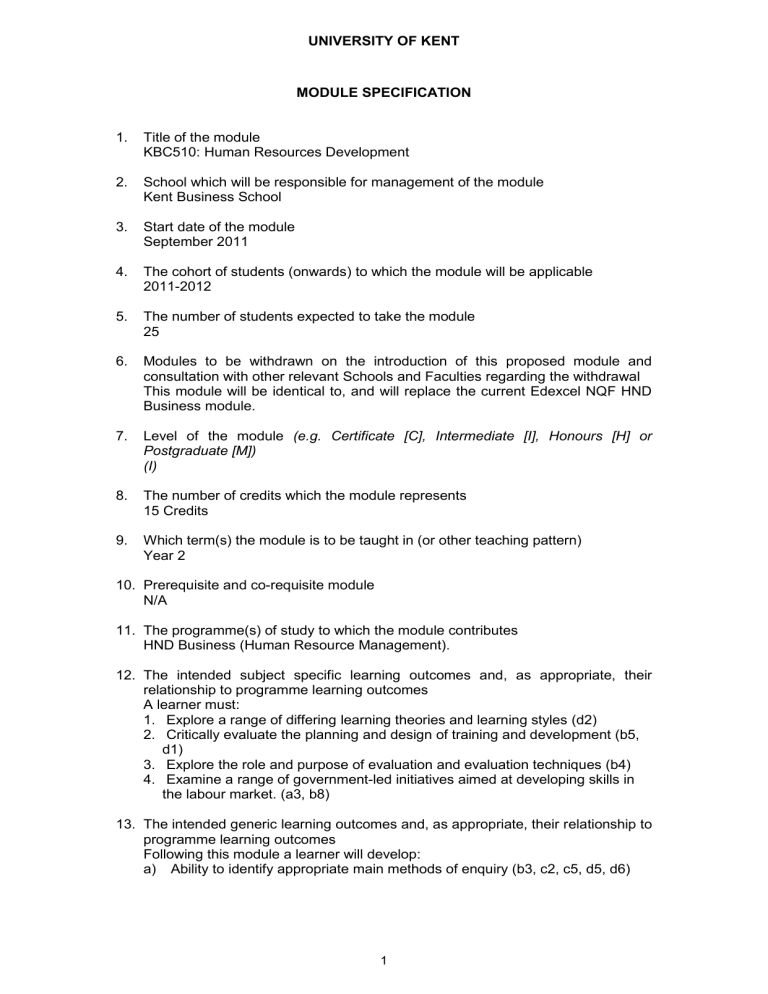University of Kent at Canterbury

UNIVERSITY OF KENT
MODULE SPECIFICATION
1. Title of the module
KBC510: Human Resources Development
2. School which will be responsible for management of the module
Kent Business School
3. Start date of the module
September 2011
4. The cohort of students (onwards) to which the module will be applicable
2011-2012
5. The number of students expected to take the module
25
6. Modules to be withdrawn on the introduction of this proposed module and consultation with other relevant Schools and Faculties regarding the withdrawal
This module will be identical to, and will replace the current Edexcel NQF HND
Business module.
7. Level of the module (e.g. Certificate [C], Intermediate [I], Honours [H] or
Postgraduate [M])
(I)
8. The number of credits which the module represents
15 Credits
9. Which term(s) the module is to be taught in (or other teaching pattern)
Year 2
10. Prerequisite and co-requisite module
N/A
11. The programme(s) of study to which the module contributes
HND Business (Human Resource Management).
12. The intended subject specific learning outcomes and, as appropriate, their relationship to programme learning outcomes
A learner must:
1. Explore a range of differing learning theories and learning styles (d2)
2. Critically evaluate the planning and design of training and development (b5, d1)
3. Explore the role and purpose of evaluation and evaluation techniques (b4)
4. Examine a range of government-led initiatives aimed at developing skills in the labour market. (a3, b8)
13. The intended generic learning outcomes and, as appropriate, their relationship to programme learning outcomes
Following this module a learner will develop: a) Ability to identify appropriate main methods of enquiry (b3, c2, c5, d5, d6)
1
UNIVERSITY OF KENT b) Ability to evaluate critically the appropriateness of different approaches to solving problems (a5, a6, c3, c5, d3) c) Ability to work in groups and teams (c8, d2, d3)
14. A synopsis of the curriculum
1 Learning theories and learning styles
Learning theories and learning styles : activists, reflectors, theorists, pragmatists,
(Honey and Mumford 1982) and Kolb’s (1979) learning style inventory; learning theories eg behaviourist, cognitive; impact of the learning curve and transfer of learning to the work place, impact of learning theories and styles when planning and designing a learning event
2 Planning and design of training and development
The systematic approach : the role of training and development policy within the organisation, identification of training and development needs, setting training objectives, planning issues eg numbers, location, content, internal/external trainers, administration; designing and using a range of training and development methods, eg advantages and disadvantages of a range of on and off-the-job methods eg ‘sitting next to Nellie’, mentoring, coaching, action learning, assignments, projects, shadowing, secondments, training courses, conferences, seminars, e-learning and outdoor development; delivery of the learning event
3 Role and purpose of evaluation and evaluation techniques
The ‘what, why, when, and who’ of evaluation : exploration of what evaluation involves and what can be measured, the importance of evaluating learning events and measuring the contribution, the need for continuous evaluation at every stage in the training cycle, the key stakeholders in the evaluation process and their roles within it
A range of evaluation techniques : eg ‘Happy Sheets’, pre/post tests, and the benefits and limitations of these; different evaluation models and the difficulties that these pose in practice eg Kirkpatrick, CIRO
4 Government-led initiatives
General and vocational training schemes and initiatives : context influencing government approaches to training and development in the UK, development of
NVQs, MCI and the competency movement, national training targets and the role of the Qualifications and Curriculum Authority (QCA), specific initiatives eg modern apprenticeship schemes, Investors in People, New Deal, University for
Industry
— Learndirect, Learning and Skills Councils, Connexions
15. Indicative Reading List
Indicative Textbooks
Barrington H and Reid M A, Training Interventions 6th Edition CIPD, 1999,
ISBN: 0852928041
Foot M and Hook C, Introducing Human Resource Management 3rd Edition FT:
Prentice Hall, 2002, ISBN: 0273651439
Moorby E, How to Succeed in Employee Development 2nd Edition McGraw-Hill,
1996, ISBN: 0077091515
Redman T and Wilkinson A, Contemporary Human Resource Management FT:
Prentice Hall, 2001, ISBN: 020159613X
Journals and newspapers
The Guardian and any other quality broadsheet newspapers
People Management
Personnel Review
Personnel Today
Training
2
UNIVERSITY OF KENT
Websites www.bized.ac.uk www.cipd.co.uk www.dfes.gov.uk www.dti.gov.uk www.guardian.co.uk www.hse.gov.uk www.iipuk.co.uk www.incomesdata.co.uk www.lsc.gov.uk www.learndirect.co.uk www.newdeal.gov.uk www.nto-nc.org www.peoplemanagement.co.uk www.personneltoday.com www.qca.org.uk www.trainingjournal.com
16. Learning and Teaching Methods, including the nature and number of contact hours and the total study hours which will be expected of students, and how these relate to achievement of the intended learning outcomes
Each HND Business module accrues 15 credits and equates to a total learning time of 150 hours. Students will be expected to undertake approximately 105 hours of independent study, including required reading, study, research and completing assignments.
There will be a total of 45 hours class contact time. This will involve a combination of lectures, exercises and learning activities. Students are expected to be active participants in discussions, activities and presentations. The application of theory to practice is an essential element in the development of the students and will be fostered and enhanced by the practical application of theory to work place related events.
17. Assessment methods and how these relate to testing achievement of the intended learning outcomes
Learning Outcome Outline details Method of assessment
Group
Presentation
Subject Specific Learning
Outcomes
1. Explore a range of differing learning theories and learning styles
Generic Learning Outcomes
Weigh ting
Words length
20% 1000
Word
Equiva lent
Individual
Written
Assignment c) Ability to work in groups and teams
Subject Specific Learning
Outcomes
1. Explore a range of differing learning theories and learning styles
30% 1500
Words
Students will complete an individual report equivalent to 1500 words that will require them to
3
UNIVERSITY OF KENT
Generic Learning Outcomes a) Ability to identify appropriate main methods of enquiry understand the range of topics covered within this module and apply them to the group task.
Students will Individual
Written
Assignment
Subject Specific Learning
Outcomes
2. Critically evaluate the planning and design of training and development
3. Explore the role and purpose of evaluation and evaluation techniques
4. Examine a range of government-led initiatives aimed at developing skills in the labour market.
Generic Learning Outcomes b) Ability to evaluate critically the appropriateness of different approaches to solving problems
50% 2500
Words complete an individual written response equivalent to 2500 words that will require them to understand the range of topics covered within this module.
18. Implications for learning resources, including staff, library, IT and space
This is an existing programme module, implications are identical with current programme maintenance requirements.
19. The Collaborative Partner recognises and has embedded the expectations of current disability equality legislation, and supports students with a declared disability or special educational need in its teaching. Within this module we will make reasonable adjustments wherever necessary, including additional or substitute materials, teaching modes or assessment methods for students who have declared and discussed their learning support needs. Arrangements for students with declared disabilities will be made on an individual basis, in consultation with the Collaborative Partner’s disability/dyslexia support service, and specialist support will be provided where needed.
20. Partner College: Canterbury College
21. University School (for cognate programmes) or Faculty (for non-cognate programmes) responsible for the programme:
University of Kent Business School
SECTION 3: MODULE IS PART OF A PROGRAMME IN A PARTNER COLLEGE
OR VALIDATED INSTITUTION
(Where the module is proposed by a Partner College)
4
UNIVERSITY OF KENT
Statement by the Nominated Officer of the College/Validated Institution "I confirm that the College has approved the introduction of the module and will be responsible for its resourcing"
.................................................................
Nominated Responsible Officer of Partner
College
………………………………………………….
Print Name
..............................................
Date
…………………………………………………..
Post
………………………………………….
Partner College/Validated Institution
Module Specification Template
Last updated July 2010
5





